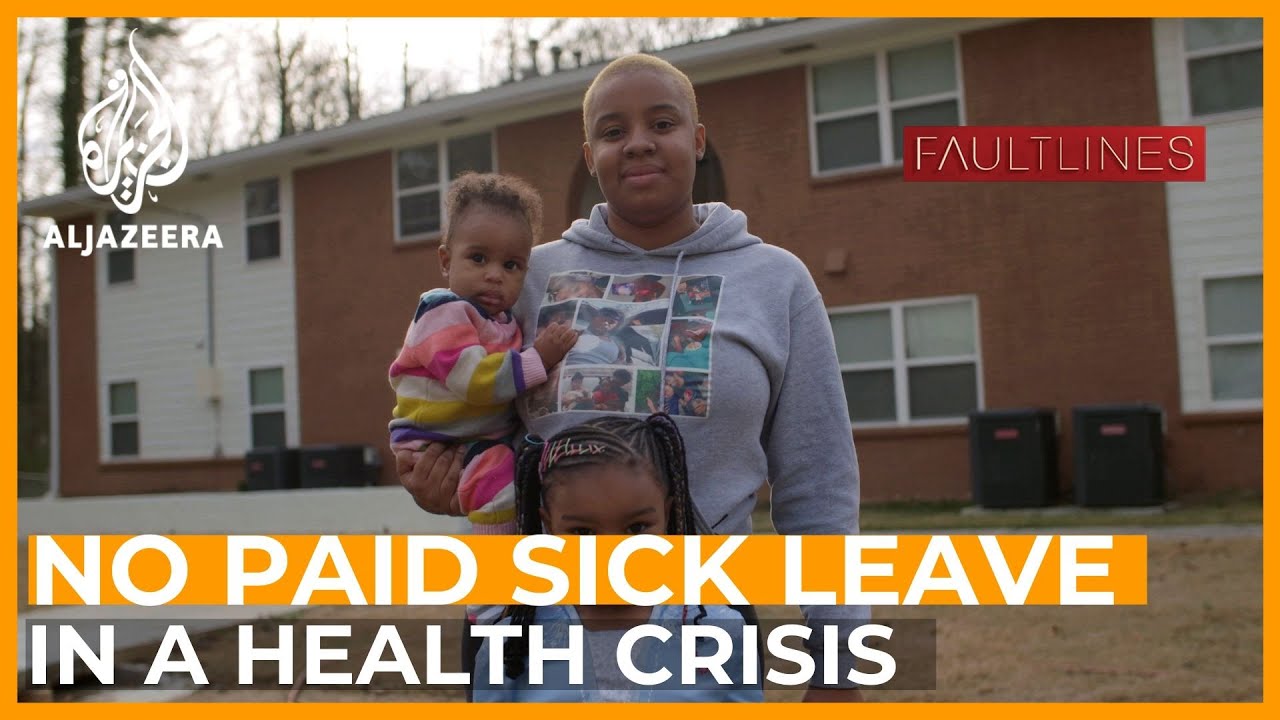The Impossible Choice: America’s Paid Leave Crisis | Fault Lines
The coronavirus pandemic has upended lives around the world.
In the United States, it has exposed the fact that this is one of the only developed countries in the world without paid sick leave.
And it is one of the only countries in the world that does not guarantee any paid time off for new mothers.
Fault Lines has travelled across the US to report on the country’s paid leave crisis.
We heard from families directly affected by a lack of paid leave: Ali and Derek Dodd, a couple in Oklahoma who tragically lost their infant son in a daycare accident, who advocate for paid family leave for parents; Leah Clay, a single mother in the state of Georgia who ended up on public assistance after taking unpaid leave from her job as a breastfeeding counsellor to care for her baby; and Jacqui Silvani, a mother in New Hampshire who lost her teaching job while taking unpaid leave to care for her toddler undergoing cancer treatment.
These cases highlight the stakes for millions of Americans who find themselves having to choose between their jobs or caring for themselves or their families. According to the US Bureau of Labor Statistics, there are 113 million Americans without paid family and medical leave – whether it is time to recover from childbirth and care for a newborn, take care of a sick family member, or recover from an illness themselves.
The last comprehensive federal legislation passed on the issue was in 1993 under former President Bill Clinton – the Family and Medical Leave Act (FMLA) – which only guarantees unpaid job-protected leave. But about 40 percent of Americans do not meet the criteria required by FMLA, and because it is unpaid, even people who do qualify often cannot afford to take it.
This has all led to a caregiving crisis in the US and the consequences can be dire. Without paid family and medical leave, many American workers face extreme financial hardship. They are often forced out of their jobs and into public assistance. Women in particular – who take on the bulk of caregiving responsibilities – are disproportionately affected. This is especially true for women of colour. The lack of adequate paid leave for new mothers, for example, can have harmful effects on the mother and the baby.
So why is there still no nationwide policy in place, and what does this mean for millions of American workers? Fault Lines investigates.




![Private: [ID: QF92r7zyTIk] Youtube Automatic](https://nezha.pro/wp-content/uploads/2023/10/private-id-qf92r7zytik-youtube-a-236x133.jpg)
![私密內容: [ID: FTDZnbPjPQU] Youtube Automatic](https://nezha.pro/wp-content/uploads/2023/07/id-ftdznbpjpqu-youtube-automati-236x133.jpg)
![私密內容: [ID: YlmkaV43dag] Youtube Automatic](https://nezha.pro/wp-content/uploads/2023/06/id-ylmkav43dag-youtube-automati-236x133.jpg)
![私密內容: [ID: SR8FZw_ZkrY] Youtube Automatic](https://nezha.pro/wp-content/uploads/2023/06/id-sr8fzwzkry-youtube-automatic-236x133.jpg)
![私密內容: [ID: ZJP3kU55JmI] Youtube Automatic](https://nezha.pro/wp-content/uploads/2023/06/id-zjp3ku55jmi-youtube-automati-236x133.jpg)
![私密內容: [ID: QKV7s89vr44] Youtube Automatic](https://nezha.pro/wp-content/uploads/2023/06/id-qkv7s89vr44-youtube-automati-236x133.jpg)
![私密內容: [ID: qJKt0hvzy7w] Youtube Automatic](https://nezha.pro/wp-content/uploads/2023/05/id-qjkt0hvzy7w-youtube-automati-236x133.jpg)
![私密內容: [ID: 76In01TZyjw] Youtube Automatic](https://nezha.pro/wp-content/uploads/2023/03/id-76in01tzyjw-youtube-automati-236x133.jpg)
![Private: [ID: SXy9SUDqUHk] Youtube Automatic](https://nezha.pro/wp-content/uploads/2023/01/private-id-sxy9sudquhk-youtube-a-236x133.jpg)
![Private: [ID: 3yD7nq-CPtI] Youtube Automatic](https://nezha.pro/wp-content/uploads/2022/11/private-id-3yd7nq-cpti-youtube-a-236x133.jpg)